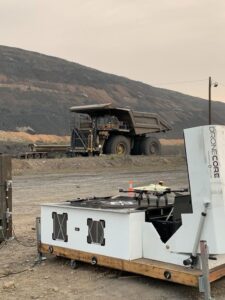

I am always inclined to answer emails that come directly from the CEO, and we set up a meeting. Henry and his team were young, enthusiastic, and incredibly smart. They were a classic start up story: a group of friends from MIT fascinated by the aerospace industry and starting up a bootstrap venture in Philadelphia. By the end of the interview, I was convinced that they might be on the right track in working toward solving the problem of battery endurance, and I was also convinced that this group of friends had the stamina and the passion to make a business work. (That first interview led to this story.)
Since 2016, both Asylon and DRONELIFE have grown. In a recent interview with Damon Henry, now in his thirties and heading up a company that has scored contracts from government agencies and major enterprise players around the world, Henry described how the company has evolved from those early days to be a major provider of security drones.
Evolution of a Drone Startup
In the first stage of the company, Asylon manufactured a battery swap station that could change the batteries of a commercial DJI drone. Customers could use one, or daisy chain the boxes to get the flight distance they needed. It was a solution for automated flight before automated flight became quite as prevalent: certainly before multiple small drone-in-a-box solutions became common.

It’s All About the Customer
How did Asylon go from drone startup to military contracts and Fortune 500 customers? Henry says that they brought in the expertise they didn’t have, adding two experts in the specific needs of their target market.
Early on, Asylon recognized that security was a great first use for automated drones. They knew they had the technology – but they really took off when they invested in understanding the customer. When Henry met Mike Quiroga, now Chief Revenue Officer, and Mike Litchco, now VP of Sales, who were working to vet new security technology for customers, he knew they’d be key additions to the company. “We had a really strong technical team – but we met up with a couple of guys who were experts in the security space,” says Henry. “That merger of the team has really been key to the success that we’ve had.”
A deep understanding of customer needs has led to the current solution. “Full stack for us is being able to provide the entire solution to the customer, putting that at their fingertips,” says Henry. “We call ourselves a white glove service – we take care of every enabling piece of the puzzle. We maintain the hardware and the software. We’re capable of remotely operating everything from Philly; but we currently staff onsite.”
Built for the Future – but Surviving the Now
It’s a well known maxim in the world of high tech startups that being too early is the same as being wrong. Henry and his team have managed to be a drone startup without getting carried away with the cool factor of drones. The Asylon solution is built to accommodate future regulations that may allow drones to be operated anywhere – while focusing on practical and valuable applications that can be performed right now. “It takes patience – the regulatory environment takes a lot of time,” says Henry. “Running a small startup and trying to stay alive long enough for the regulations to evolve is hard.”
We’ve effectively bootstrapped and stayed pretty small on purpose, just to make sure we survive. But we’re still here,” he says.
“We see physical security as a layered approach – the drone isn’t going to be the be all, end all, for any site. We integrate with other systems, like electric fences. The electric fence is always going to be the ultimate barrier: but if the electric fence goes off, you have to go investigate,” he explains. “The drone can go investigate,the guards can get live stream video, and then they can make an informed response. They can see the video on their tablet and their phone. By having them work together, you have an effective solution.”
DroneCore is realistic, legal, and available now. It saves clients money, time, and effort. And Asylon continues to evolve the solution thoughtfully, always focused on what their customer is trying to achieve.
“Despite how crazy a year 2020 has been, it’s been our best year,” says Henry. “The case for automation has grown: we’ve seen a growth in our sales, we’ve seen a growth in our deployments. Big enterprise customers are willing to put money behind it. 2020 has been a big year for us… and 2021 will be an even bigger year.”
Miriam McNabb is the Editor-in-Chief of DRONELIFE and CEO of JobForDrones, a professional drone services marketplace, and a fascinated observer of the emerging drone industry and the regulatory environment for drones. Miriam has penned over 3,000 articles focused on the commercial drone space and is an international speaker and recognized figure in the industry. Miriam has a degree from the University of Chicago and over 20 years of experience in high tech sales and marketing for new technologies.
For drone industry consulting or writing, Email Miriam.
TWITTER:@spaldingbarker
Subscribe to DroneLife here.